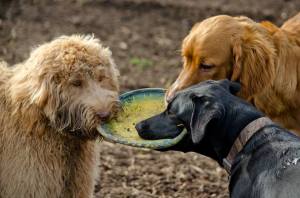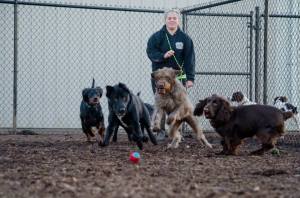Just like in humans, when calories consistently exceed daily energy expenditure, dogs and cats can become overweight.

Besides overfeeding, there are numerous environmental and social factors that contribute, including decreased daily exercise as a result of the summer heat, or confinement to the house while leash holders are off at work.
Over-indulging with treats and eating table food can also lead to pets consuming excessive calories each day and packing on extra pounds.
An estimated 54% of dogs and cats in the United States are overweight or obese.
It is important to read the nutritional labels on all packaged food and treats given to your pet–just as you would with your own food. Dog and cat snacks reportedly have contained toxic chemicals and preservatives or they don’t include quality ingredients that promote good health. Here’s a list of healthy treat options.
Treats and snacks should only make up 10% of a dog’s daily calories.
Some primary health risks for overweight dogs and cats are:
- Osteoarthritis
- Insulin resistance and type 2 diabetes
- High blood pressure
- Heart and respiratory disease
- Cranial cruciate ligament injury
- Kidney disease
- Many forms of cancer
- Decreased life expectancy (up to 2.5 years)
- Learn more here.
One of the best ways to combat pet obesity is to take dogs on more walks (or longer walks) or play fetch for an extra 15 minutes or so.

There may also be a medical condition that is causing your pet’s excess weight. Please consult your veterinarian with any questions about your pet’s health before proceeding with any diet regime.
For indoor cats struggling with obesity, try more one-on-one playtime with their favorite toys or introduce new games that require physical movement.
Doggy daycare is another great option for those who don’t have extra time for walks during the day due to work or family commitments.
Consider dropping your fur baby off at Rover Stay Over where they can socialize and get exercise with others—they’ll come home dog tired!
